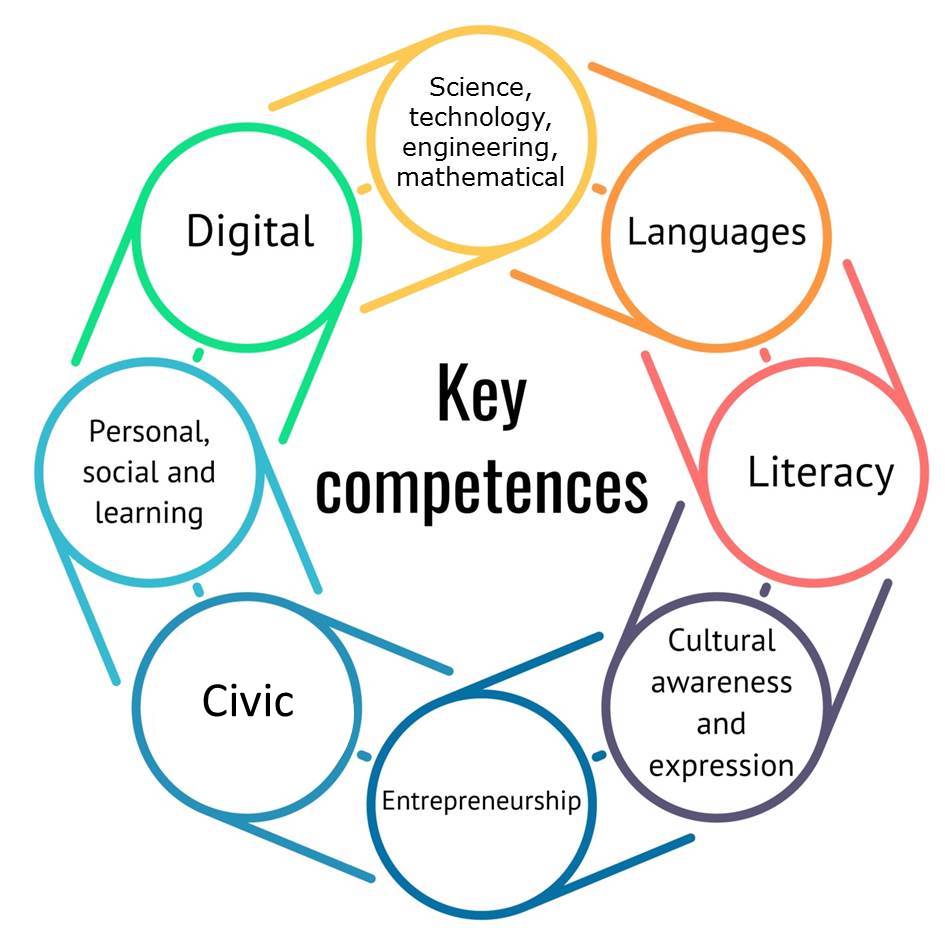mobvet
Eight key competences
The aim of this exercise is to link the 8 key competences of lifelong learning to the skills and competences you acquired during mobility.

Multilingual competence
The ability to communicate using different languages effectively, in an appropriate range of societal and cultural contexts according to one’s wants or needs. It is based on the ability to understand, express and interpret concepts, thoughts, feelings, facts and opinions in both oral and written form; It relies on the ability to mediate between different languages and media.
Personal, social and learning to learn competence
It refers to the knowledge of the components of a healthy mind, body and lifestyle, namely the ability to reflect upon oneself, to work with other in an effective and constructive way, to effectively manage time and information and to remain resilient. It includes the ability to cope with uncertainty and complexity, learn to learn, to support one’s physical, mental and emotional well-being and health, to manage conflict in an inclusive and supportive context.
Citizenship competence
It refers to the understanding of social, economic, legal and political concepts and structures, as well as global developments and sustainability. It is the ability to act as responsible citizens and to fully participate in civic and social life.
Entrepreneurship
It is based on creativity, critical thinking and problem solving, as well as on taking initiative and perseverance. It refers to act on opportunities and ideas and to transform them into values for others and to the ability to work collaboratively in order to plan and manage cultural and social projects.
Cultural awareness and expression
It includes the understanding of the different ways of communicating and expressing ideas in different cultures and through a range of arts and other cultural forms. It is the ability to express and interpret figurative and abstract ideas, experiences and emotions with empathy, and the ability to do so through arts and cultural forms.
Digital competence
It includes information and data literacy, communication and collaboration, media literacy, digital content creation, digital well-being and competences related to cybersecurity, intellectual property related questions and problem solving. It involves the confident, critical and responsible use of digital technologies for learning, at work, and for participation in society.
Mathematical competence and competence in science, technology, and engineering
For this competence, the emphasis is on process and activity, as well as knowledge. It refers to the ability to use math to solve problems in everyday life situations in terms of mathematical thinking and presentation (formulas, models, constructs, graphs, charts).
Competence in science refers to the ability and willingness to explain the natural world by making use of the body of knowledge and methodology in order to identify questions and to draw evidence-based conclusions. Competence in science, technology and engineering involves an understanding of the changes caused by human activity and responsibility as an individual citizen.
Literacy competence
It represents the ability to identify, understand, express, create and interpret concepts, feelings, facts and opinions in both oral and written forms, using visual, audible and digital materials across contexts and disciplines. The development of literacy represents the basis for further learnings and linguistic interaction, since it implies the ability to communicate with others, in a creative, effective and appropriate way.
In the assigment, combine the sentences with the appropriate competency, see Quiz.


